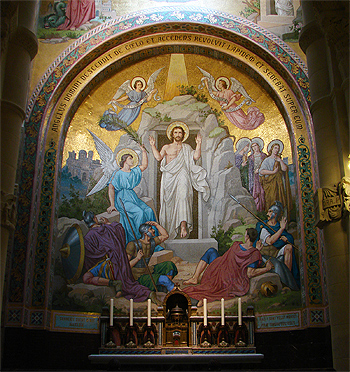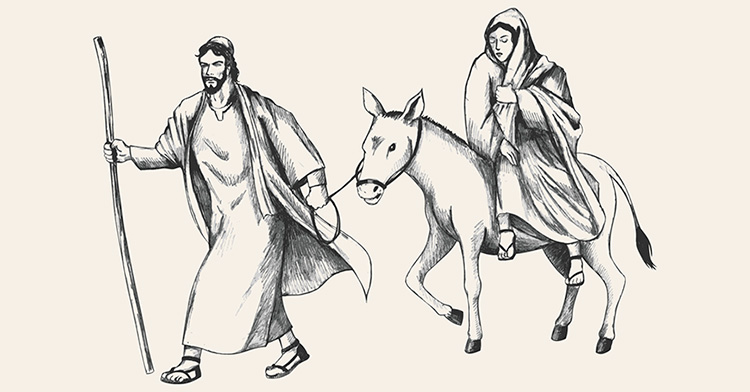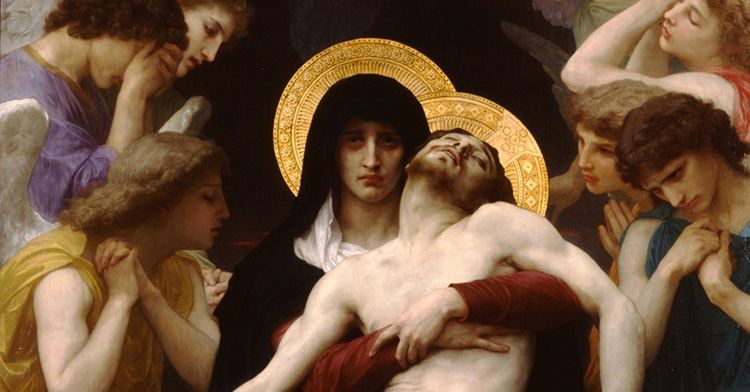It may seem strange to suggest that part of leading well is helping people see the connection between Christmas and Easter. But it is. For without this connection, Christians have no reason for their joy. Our commercialization of Christmas tries to isolate Christmas, to make it stand on its own apart from Easter. This is a recipe only for sadness.
Of course, practically speaking, it is hard to lead when morose, and it may be even harder to follow a morose leader. More deeply, however, joy is the final response Christians can have to the world in which we live, and especially during Advent and Christmas, leaders need to understand why we can rejoice and why our institutions can be places of joy.
One of the striking things about the first Christmas is the announcement of good tidings. Of all the Gospels, the Gospel of Luke is the most explicit. The angel Gabriel says to Mary, “You will conceive in your womb and bear a son, and you will name him Jesus. He will be great, and will be called the Son of the Most High, and the Lord God will give to him the throne of his ancestor David. He will reign over the house of Jacob forever, and of his kingdom there will be no end!” (Luke 1:31-33).
Later, an angel -- soon joined by “a multitude of the heavenly host” -- piles up exclamations one on top of another and says to the shepherds, “I am bringing you good news of great joy for all the people! To you is born this day in the city of David a Savior, who is Christ the Lord!” (Luke 2:10-11).
And Simeon, an old prophet who was awaiting the consolation of Israel, cries out to God when he sees the infant Jesus, “My eyes have seen your salvation, which you have prepared in the presence of all peoples, a light for a revelation to the Gentiles and for glory to your people Israel” (Luke 2:30-32).
As one reads on in the Gospel, however, joy does not appear on every page.
Indeed, just as Jesus begins his ministry, he is met not by throngs of rejoicing people but by the devil, who tempts him when he is hungry and isolated. Very soon after he bests the devil, moreover, Jesus’ hometown crowd first speaks highly of him but then swiftly turns on him and attempts to throw him off a cliff.
As one follows the story, demons beset Jesus, scholars challenge him, the high and mighty plot against him, and his own disciples prove hardheaded again and again. And in the end, he is executed as a criminal -- in the place of the murderer Barabbas and alongside two other bona fide “evildoers,” as Luke puts it.
The promised joy comes to an end. The disciples forget Jesus’ predictions of being raised on the third day, and the women at the tomb are utterly dejected in their grief. Hmmm. What sort of story of glad tidings is this?
Of course, there are earlier hints that the joy will be mingled with sadness. Immediately after his prayer of thanksgiving, for example, Simeon tells Mary that her child “is destined for the falling and rising of many in Israel and to be a sign of opposition, so that the inner thoughts of many will be revealed -- and a sword will pierce your own soul, too” (Luke 2:34-35).
And Jesus regularly reforms -- or tries to -- the disciples’ expectations to include his suffering and death: “The Son of Man must undergo great suffering, and be rejected by the elders, chief priests, and scribes, and be killed, and on the third day be raised” (Luke 9:22).
Still, the promises of Christmas linger on for them; at no less significant a moment than the Last Supper itself, the disciples argue yet again about who will be the greatest in the coming kingdom -- that is, they clearly still believe that Christmas is coming.
A few short hours later, however, their belief is devastated, as the one who was to live out the truth of God’s promises hangs upon the cross. Death, as the disciples themselves understand, is the end of these promises.
Unless, of course, death itself is overcome.
If death is no longer the end, the promises of Christmas are renewed. Christmas, in other words, requires Easter. Christmas is the announcement of glad tidings. But without Easter, Christmas is nothing but disappointment, the failed promises of God and his dead would-be Messiah. Easter -- the resurrection -- is why Christmas is Christmas. The glad tidings of Gabriel, the angels, the prophet Simeon and the others are glad precisely because the death of Jesus was not their end.
Not only does Easter resurrect the promises of Christmas; it also transforms them. No longer can we hear Gabriel’s words or the angel’s proclamation without the knowledge that death and resurrection are the condition of their fulfillment. No sentimentality, no heroics, no jingle. Forward-pointing hope is what these promises become. They look to Easter for their fulfillment, and from this fulfillment comes our joy.
Many Christian institutions look for ways to acknowledge the joy that Christmas is supposed to be -- churches, obviously, but also extensions of churches, such as food banks and homeless shelters, harness the “Christmas spirit” to their good ends. Leaders of these institutions would do well to note that Christmas is only the beginning, and that, in fact, were it all that we had, we would be fooling ourselves about the joy that is here.
















